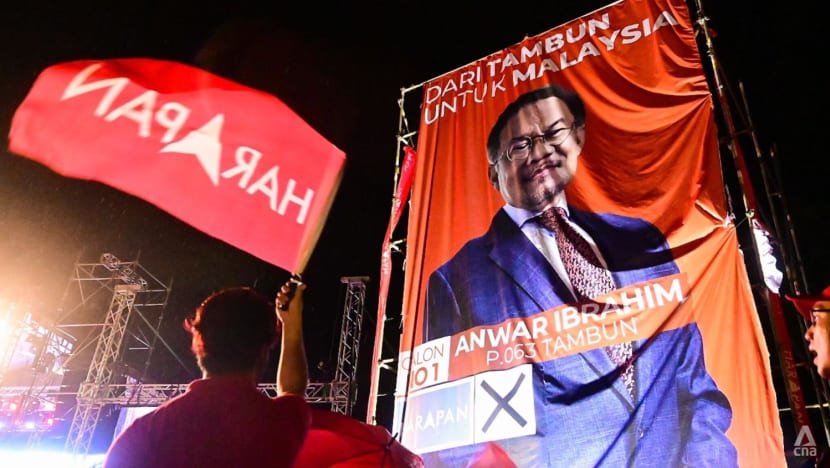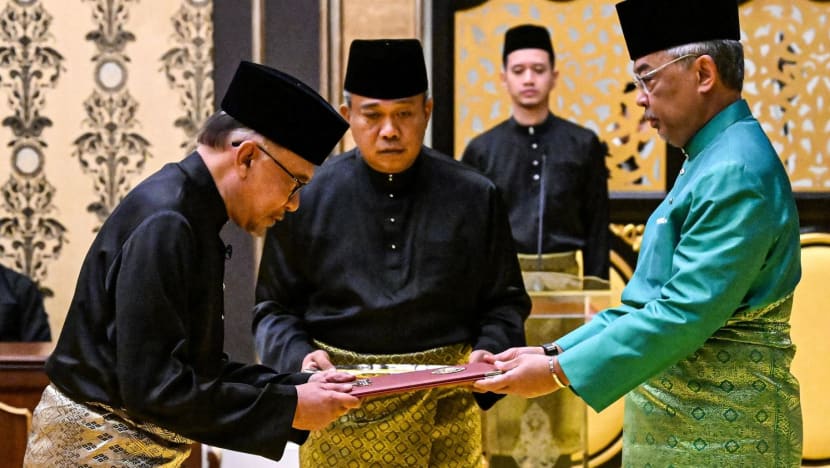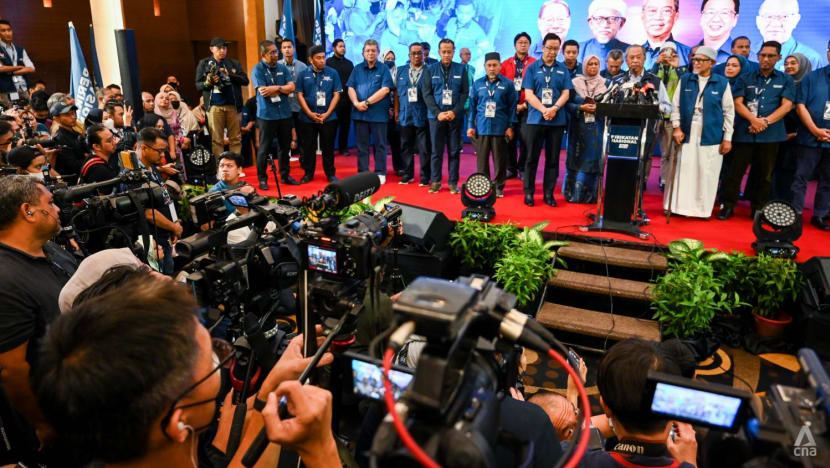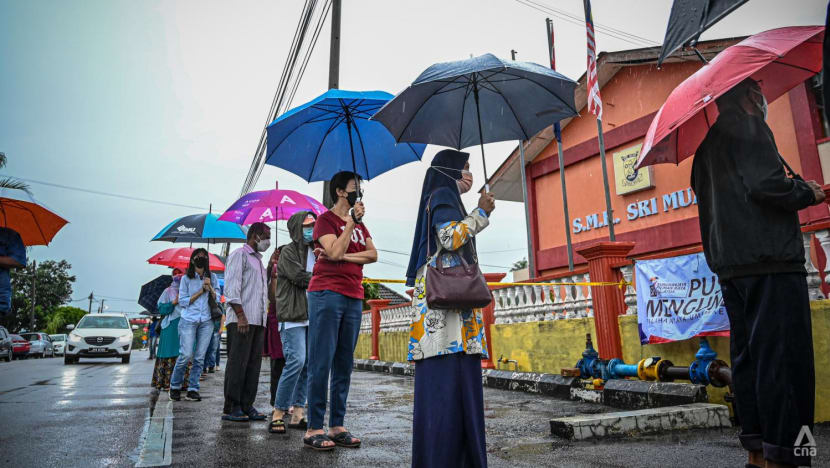IN FOCUS: As dust settles over Malaysia’s political uncertainty, can Anwar’s new government bring stability?
CNA revisits the political drama in the lead up to Anwar Ibrahim’s appointment as prime minister and looks at what lies ahead for his unity government.

KUALA LUMPUR: Amid the political turmoil that engulfed Malaysia last week after the 15th General Election (GE15) results yielded a hung parliament, Mr Anwar Ibrahim was a picture of calm.
As the Pakatan Harapan (PH) chairman exited his office in Petaling Jaya in his car last Wednesday (Nov 23), the 75-year-old rolled down his window in front of a group of reporters and handed over a few bags of popcorn.
Journalists bombarded him with questions on where he was headed and if there were updates on coalition negotiations.
But he simply smiled. “Here’s some popcorn. Go watch the movie,” he said.
It was believed to be a reference to the unfolding political drama that was keeping Malaysians on the edge of their seats.
By then, it had been four days since Malaysians went to the ballot boxes but the election outcome remained in a deadlock. No prime minister had been appointed, much less a Cabinet.
Amid the uncertainty, the value of the ringgit plummeted as investor anxiety set in.
On Nov 24 afternoon, the king announced the decision to appoint Mr Anwar as Malaysia’s 10th prime minister.
Looking back at the chain of events that took place during the immediate post-election period, CNA spoke to several politicians to get their insights on what transpired.
Going forward, Mr Anwar is likely to have his hands full in maintaining a stable unity government, especially with a slew of state elections scheduled for next year, according to analysts.

HOW THE UNITY GOVERNMENT CAME ABOUT
In line with what many observers had predicted, the election results on Nov 19 produced no clear winner.
Mr Anwar’s PH coalition won 82 seats, including the single seat won by its ally the Malaysian United Democratic Alliance (MUDA).
Perikatan Nasional (PN), led by former prime minister Muhyiddin Yassin, outperformed estimates and clinched 73 seats. Its component Islamic party, Parti Islam Se-Malaysia (PAS), won 43 seats, romping to victory in constituencies in the rural Malay heartland.
There was a big shock in the performance of the Barisan Nasional (BN) coalition, led by Ahmad Zahid Hamidi, which won just 30 seats.
Borneo-based coalition Gabungan Parti Sarawak (GPS) eventually clinched 23 seats.
None of the coalitions had the minimum 112 seats to clinch a simple majority in the Lower House and form a new government for the first time in Malaysia’s history.
In their respective press conferences after the polling, Mr Anwar said PH had the support of the majority of MPs while Mr Muhyiddin of PN stated that he had received a positive response from the parties in Sabah and Sarawak to support his bid to be prime minister.
It was a bleak night for the United Malays National Organisation (UMNO), BN’s lynchpin party.
UMNO’s information chief Isham Jalil, who himself lost his challenge for the Shah Alam federal seat, recounted the disappointment among party members.
BN had also recorded a poor showing in the last national polls in 2018, when the coalition lost control of the federal government for the first time in 60 years. Then, BN won 79 seats, more than double the number of seats garnered in 2022.
“It was my stand (that night) that BN should be part of the opposition. The people have made their voices known twice,” said Mr Isham in an interview with CNA.
“I suggested, and the (UMNO) leadership later issued a statement on this, saying that PH and PN should merge to form a government together. They would have more than 150 seats. This is a formidable number,” he added.
However, Mr Muhyiddin had stated that he did not want to work with PH and his coalition then set the wheels in motion to gather support in the 222-seat Lower House.
The following Sunday morning, GPS leader Abang Johari Abang Openg met Mr Muhyiddin to discuss the formation of a new federal government.
At that juncture, it became clear mathematically that both PN and PH needed BN’s 30 MPs to clinch a simple majority. BN had become an unlikely kingmaker.

On Nov 21 in the morning, BN politicians held a meeting with some PH leaders at Seri Pacific Hotel in Kuala Lumpur.
Parti Keadilan Rakyat (PKR) vice president Nik Nazmi Nik Ahmad was among the PH leaders who were at the meeting.
He told CNA that at that point, PH had to take a practical approach if it wanted to form the next government. This meant working with the likes of BN, a coalition it had fought fiercely against during the polls.
“It was about the task of forming the government and I think a lot of our supporters saw that going together with PN was a big no-no. Then, we had to be a bit more pragmatic,” Mr Nik Nazmi recounted in an interview prior to the unveiling of the Cabinet.
He has since been picked as the minister for natural resources, environment and climate change.
“If it is not with PN, then BN and GPS are the obvious choices. You have the other parties, but without BN and GPS, it does not become a stable government,” added the PKR politician who successfully defended his Setiawangsa seat in Kuala Lumpur.
After the meeting, Mr Anwar told the media that he was “very pleased” with the progress of talks between the two coalitions.
Meanwhile, PN secretary-general Hamzah Zainudin said that the coalition had already submitted the statutory declarations of more than 112 politicians who won their contests in support of Mr Muhyiddin to the palace. The minimum number needed to elect a prime minister is 112.
On Nov 22, the king met Mr Anwar and Mr Muhyiddin at the national palace.
Speaking to the media afterwards, Mr Muhyiddin revealed that the ruler had suggested a unity government with PH, but he declined the request.
On his part, Mr Anwar said that there had been no decision made by the king on who would be the next prime minister.
As the stalemate continued into the fourth day on Nov 23, the king met with key leaders from BN and GPS.
Mr Isham of UMNO said even at that point, BN still wanted to be in the opposition. But it started to sink in that if a government could not be formed, there would be no opposition either.
“Since Muhyiddin did not agree (with what the king was suggesting), we were then forced to make a decision,” he said.
Mr Isham added that when BN’s chairman Ahmad Zahid, deputy president Mohamad Hasan and secretary-general Zambry Abdul Kadir were summoned by the king on that Wednesday, they were asked to “work together with other parties to build a unity government”.
Later that night, Mr Isham and other party leaders attended a UMNO supreme council meeting which ended after 1am. After the meeting, the party announced that BN would be part of a unity government but not one led by PN.
“We in UMNO have never gone against the word of the king. So what choice did we have?” Mr Isham told CNA.
“The market was jittery and people were anxious. So we adhered to the decree of the king and agreed to be part of a unity government,” he added.
It seemed that the fog had started to clear.
Early on Nov 24 morning, secretary-general of the Democratic Action Party (DAP) Anthony Loke visited Sarawak to speak with GPS chief Abang Johari. It was seen as a move to offer an olive branch.
Mr Loke said in a statement: “I have told (Abang Johari) that if there were any statements issued by DAP leaders which insulted the people and government of Sarawak, I on behalf of DAP would like to openly apologise.” DAP is a PH component party.
GPS had initially pledged support for PN, but later said that it would heed the king’s wishes to be part of a unity government.
Later that afternoon, after a special meeting with other rulers, the king announced that he had decided to appoint Mr Anwar as prime minister, and the PKR president would be sworn in at 5pm.
Mr Nik Nazmi of PKR said it has been quite a journey and it was satisfying to see Mr Anwar being sworn in.
“We have seen so many false dawns of Anwar becoming prime minister that we did not want to believe it until we saw him taking his oath,” he told CNA.
“The days when one party got a two-thirds majority before 2008 is not going to happen again,” he added.
In 2008, BN lost its two-thirds majority for the first time in its history of ruling Malaysia since independence.

WHAT NEXT FOR MUHYIDDIN'S PN?
In the days since Mr Anwar was appointed, some PN leaders have maintained that things could have easily turned out differently and that PN would be leading the government with Mr Muhyiddin as prime minister.
In a Facebook post detailing what happened behind the scenes, which was later reported by various local media outlets, Mr Muhyiddin’s senior aide Marzuki Mohamad explained that the palace made an initial offer for PN and PH to form a unity government while “rotating the post of the prime minister”. This offer was rejected by Mr Muhyiddin, he wrote.
As of Dec 2, Mr Anwar’s unity government comprises PH, BN, GPS and Gabungan Rakyat Sabah (GRS). PN remains the only major coalition in the opposition.
In a phone interview with CNA, PAS Information chief Khairil Nizam was adamant that PN had the numbers to form the government. However, he said the coalition no longer wished to dwell on this.
“It is already (purely) academic and we have to move forward,” said the politician who won the Jerantut federal seat in Pahang.
“We need to be an opposition that must be ready to collaborate, be constructive, be responsible, and be loyal to the government. If you have that sort of characteristic as an opposition, we can act as a check and balance to the government,” said Mr Khairil.
Mas Ermieyati, who defended her Masjid Tanah federal seat in Melaka under a PN ticket during the recent polls, echoed similar sentiments.
She said that PN should move on from this episode and prepare its mind to be an effective opposition.
“On our part, we want to ensure a check and balance and play the role of the opposition well. There are a lot of Bills and issues that are pending in parliament,” she told CNA.
James Chin, who is a Professor of Asian Studies at the University of Tasmania, said that PN’s claims that they should be leading the government were “irrelevant” and that Malaysia politics has “moved on quickly” from the episode.
“The reason why there was some confusion was because PN (relied on) MPs making statutory declarations (in support of Mr Muhyiddin as prime minister) but these are no longer worth much in the Malaysia context,” said Prof Chin.
He explained that especially after the anti-party hopping law took effect on Oct 5, the politicians have to adhere to the decision made by their respective parties or risk losing their seats if they defected.

IS THE BN-PH ALLIANCE DESTINED TO FAIL?
The relationship between PH and BN is critical in an analysis of whether the unity government would finally bring political stability after several years of turbulence.
This is the first time they are joining forces to lead the federal government.
Observers noted that both coalitions had campaigned fiercely against the other during the course of the election. Hence, it might be difficult to see how they could team up for the long term.
Yet, Mr Adib Zalkapli, director of consulting firm BowerGroupAsia, told CNA that PH and BN “are united by common enemies” - PN’s main component parties PAS and Parti Pribumi Bersatu Malaysia (Bersatu).
“In politics, this is sufficient to keep a diverse coalition united, until of course Bersatu and PAS weaken significantly. But that is not going to happen in the near future,” Mr Adib predicted.
He added that Mr Anwar’s toughest test is to keep BN and UMNO on his side. If he manages to do so, the other coalition partners GPS and GRS will likely maintain their support.
PKR’s Mr Nik Nazmi noted that the PH-BN pact still makes some politicians in both camps uneasy.
“To be honest, there are people who are unnerved by it, within UMNO and within PH,” he said.
However, he said that PH has learned from its experience working with another Malay-nationalist-centric party Bersatu after the 2018 polls, and vowed that the coalition will do better this time.
The PH administration, which included PKR, DAP and Bersatu, lasted just 22 months before it fell apart due to infighting in Feb 2020 after the political manoeuvre known widely as the “Sheraton Move.”
Then, Mr Muhyiddin's Bersatu withdrew from PH, triggering the fall of the government.
Mr Nik Nazmi said that Bersatu, similar to UMNO, was not a natural ideological ally of PH. Still, PH and Bersatu managed to work together to topple the BN government led by then prime minister Najib Razak.
“When we won, people were caught in the euphoria. When we were in government, there was no real narrative from our side so at the time Bersatu wanted to out-Malay UMNO and PAS,” said Mr Nik Nazmi.
“At times, we wanted to show we were so progressive. We had a non-Malay as the minister of finance, the chief justice and the attorney-general. There was also the International Convention on the Elimination of All Forms of Racial Discrimination (ICERD). These sorts of things pulled us in two directions, there was no communication,” he added.

Meanwhile, from BN’s perspective, this alliance with PH could be an opportunity for the coalition to reset and come back stronger.
On Wednesday, BN chairman Ahmad Zahid wrote a Facebook post saying that the coalition’s principle to reject working with PKR and DAP was only for the GE15 campaigning period. But considerations changed after the results were known, he said.
He added that working with the likes of DAP will not cause BN to lose its identity or abandon its principles.
UMNO information chief Mr Isham highlighted that from a strategic perspective, working together with PH could be a shrewd move as there would be fewer contests for seats if they link up for future elections.
He noted that PN and BN would typically want to contest and win seats within the rural Malay heartland. Additionally, if BN were to partner with PN in the upcoming polls, it would be forced to play second fiddle.
“So if we want to be successful in rebuilding the party, we have to be smart in negotiating seat allocations. We contest in Malay areas and our pool of seats in the heartland will get smaller (if we work alongside PN),” said Mr Isham.
CABINET LINE-UP A DELICATE BALANCING ACT
In the short term, one of the biggest challenges faced by Mr Anwar was the formation of his Cabinet as he wanted a leaner team compared to previous administrations.
On Friday night, he unveiled his Cabinet line-up, appointing Ahmad Zahid and GPS’ Mr Fadillah Yusof as his deputies.
Mr Anwar will also serve as the finance minister, while Mr Tengku Zafrul Abdul Aziz will serve as the trade minister.
The defence and economy portfolios will be held by Mr Mohamad Hasan and Mr Rafizi Ramli respectively.
Mr Loke will be the transport minister while Mr Mohamad Sabu will serve as the agriculture minister.
The new line-up comprises 28 ministers, which is leaner than the recent Cabinet teams helmed by Mr Ismail Sabri Yaakob and Mr Muhyiddin. The list of deputy ministers has yet to be announced.
Under the Ismail Sabri administration, there were 31 ministers and 38 deputies. Mr Muhyiddin, meanwhile, had a Cabinet of 32 ministers and 38 deputies.
Prof Chin of the University of Tasmania told CNA that Mr Anwar had “little choice” but to pick Ahmad Zahid as deputy prime minister in spite of his outstanding graft charges. This is because the prime minister needed to strengthen Ahmad Zahid’s position within UMNO, he said.
Prof Chin noted that there is a faction within UMNO led by Mr Ismail Sabri and former defence minister Hishammuddin Hussein who disagreed with the pact with PH.
“Everyone knows that it was (Ahmad) Zahid who played an instrumental role in pressuring BN to work alongside PH in the formation of the government. (Ahmad) Zahid is also president of UMNO, so if they are to be given a DPM post, it would make the most sense to give it to him,” he added.
He opined that it was a shrewd move for Mr Anwar to opt against giving DAP a high-profile Cabinet post such as finance, defence or education.
Mr Loke will once again serve as transport minister, a post he held during the previous PH administration from 2018 to 2022.
Meanwhile, former deputy speaker Mr Nga Kor Ming has been appointed housing and local government minister, while Ms Hannah Yeoh will be the youth and sports minister.
“That's a smart move because it’s much harder for the Malay-centric parties in the opposition to accuse this government of being too accommodating towards DAP,” he added. DAP is a Chinese-dominated party.
Independent political analyst Dr Zaharuddin Sani Sabri felt that it was risky for Mr Anwar to hold the finance portfolio.
“If we look into the history of 1MDB (1Malaysia Development Berhad), the misuse of power led to the huge corruption scandal,” said the former deputy director general of the government’s Special Affairs Department.
He added that the appointments of the ministers from BN reflected an effort to strengthen Ahmad Zahid’s power within UMNO.
“It is an indicator of how the UMNO elections will be and Ahmad Zahid will make sure his position is secure. The UMNO election is in six months and he will need to strengthen himself.
“This also ensures stability in BN so that no one will go against Anwar during the confidence vote (in parliament) on Dec 19.”
Dr Zaharuddin, however, said that a big test of Mr Anwar’s unity government will be the spate of state elections which are likely to be held next year.
While Pahang, Perak and Perlis held their elections simultaneously with the federal elections, the state legislatures of Selangor, Negeri Sembilan, Penang, Kedah, Kelantan and Terengganu will have to dissolve next year.
“I don’t believe that the PH and BN will work together because their ideologies are quite different,” said Dr Zaharuddin.
“You can see that it's going to be quite difficult for them not to compete against one another in the coming elections unless they can come up with a memorandum of understanding,” he added.
With all eyes on how Mr Anwar’s government gets down to tackling challenges on the ground, a steady and stable government would go a long way in avoiding another drawn-out political drama that leaves Malaysians in suspense.





















